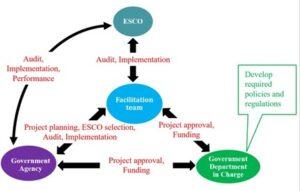Introduction
In Tamil Nadu, a state situated on the southeastern coast of India, the construction industry is witnessing rapid growth and development. With the surge in infrastructure projects and urbanization, it is crucial to have an efficient system in place to ensure that building plans are approved swiftly and accurately. In this blog post, we will delve into the process of building plan approval in Tamil Nadu, exploring the steps involved, key stakeholders, challenges faced, and potential solutions to streamline the process.
1. Understanding the Building Plan Approval Process
Building plan approval in Tamil Nadu follows a well-defined procedure to ensure compliance with safety regulations, building codes, and land-use regulations. The process typically involves the following steps:
- Submission of Application: The first step is to submit the building plan along with necessary documents to the concerned local authority website, such as the Chennai Metropolitan Development Authority (CMDA) https://www.cmdachennai.gov.in/ or the respective municipal https://www.tn.gov.in/tcp/building_plan.html
 Scrutiny and Verification: The submitted plans are thoroughly scrutinized by a team of experts to assess their compliance with zoning regulations, setbacks, floor area ratios (FAR), and structural stability. The verification process also includes an assessment of environmental impact, fire safety, and adherence to other applicable
Scrutiny and Verification: The submitted plans are thoroughly scrutinized by a team of experts to assess their compliance with zoning regulations, setbacks, floor area ratios (FAR), and structural stability. The verification process also includes an assessment of environmental impact, fire safety, and adherence to other applicable- Technical Committee Review: The scrutinized plans are then forwarded to a technical committee for a comprehensive review. The committee assesses the feasibility of the project, ensures compliance with building norms, and provides recommendations or corrections if
- Public Notice and Objection Period: After the technical committee review, a public notice is issued regarding the proposed construction. This allows the general public to raise objections, if any, within a specified
- Approval and Issuance of Building Permit: If no objections are received or objections raised are resolved, the local authority grants the building plan approval and issues the requisite building
2. Key Stakeholders Involved
Several stakeholders play a crucial role in the building plan approval process in Tamil Nadu:
- Local Authorities: The local authorities, such as CMDA or municipal corporations, are responsible for receiving and processing building plan applications. They ensure that the plans comply with applicable laws, regulations, and safety
- Technical Committees: Comprising architects, engineers, town planners, and other experts, the technical committees assess the technical aspects of the building plans, including structural stability, fire safety measures, and adherence to zoning
- Public: The general public has the opportunity to raise objections during the public notice Their involvement ensures transparency and accountability in the approval process.
- Architects and Engineers: Qualified professionals play a vital role in preparing and submitting the building plans, ensuring compliance with building codes, safety norms, and functional

3. Challenges in the Approval Process
Despite the structured approval process, several challenges hinder the timely approval of building plans in Tamil Nadu. These challenges include:
- Lengthy Approval Timelines: The approval process can be time-consuming, with the need for multiple levels of scrutiny and committee reviews, leading to delays in the commencement of construction
- Lack of Clarity and Transparency: Sometimes, there is a lack of clear guidelines and communication from the local authorities, resulting in confusion and subjective interpretations of This can lead to unnecessary rework and delays.
- Corruption and Red Tape: Instances of corruption and bureaucratic red tape can pose significant hurdles in the approval process, discouraging honest and efficient execution of duties by
- Limited Resources and Expertise: Insufficient staff and technical expertise in the local authorities can cause delays in plan scrutiny and review, especially when there is a surge in

4. Streamlining the Approval Process
To overcome the challenges and streamline the building plan approval process in Tamil Nadu, various measures can be implemented:
- Technology Adoption: The integration of technology, such as online submission portals, automated plan scrutiny software, and virtual inspections, can significantly reduce paperwork, enhance efficiency, and ensure
- Capacity Building: Local authorities should invest in recruiting and training additional staff with the necessary technical expertise to expedite the scrutiny and approval
- Clear Guidelines and Standardization: Establishing clear guidelines and standardizing the interpretation of regulations can minimize confusion and subjectivity, enabling faster approval of building
- Public Awareness and Participation: Conducting public awareness campaigns and encouraging public participation during the approval process can foster transparency, trust, and
Conclusion
Efficient building plan approval processes are crucial for the growth and development of the construction industry in Tamil Nadu. By addressing the challenges and implementing streamlined procedures, the state can facilitate faster approvals while ensuring compliance with safety and regulatory standards. Collaboration between local authorities, stakeholders, and the public is essential to create an environment that promotes transparency, accountability, and timely execution of construction projects. With a streamlined approval process, Tamil Nadu can foster sustainable development and meet the growing infrastructure needs of its citizens.
Frequently asked questions (FAQs)
- What is the current procedure for obtaining building plan approval in Tamil Nadu?
- Provide an overview of the existing process, including the necessary documents, fees, and steps involved in getting building plan approval.
- Are there any recent changes or updates in the building plan approval process in Tamil Nadu?
- Highlight any recent policy changes, amendments, or updates made by the authorities that might impact the approval process.
- How can applicants expedite the building plan approval process?
- Offer tips or suggestions on how individuals or businesses can navigate the approval process more efficiently, such as utilizing online services, ensuring all documents are in order, etc.
- What common challenges do applicants face during the building plan approval process, and how can they be addressed?
- Identify common issues or hurdles faced by applicants and provide solutions or guidance on overcoming these challenges.
- Is there a helpline or support system available for clarification or assistance during the building plan approval process?
- Share information on any helpline numbers, online support, or dedicated offices where applicants can seek assistance or clarification regarding the approval process.

